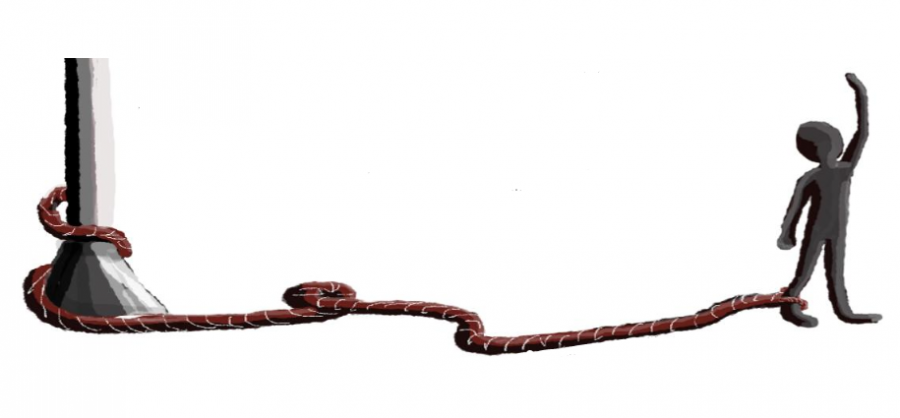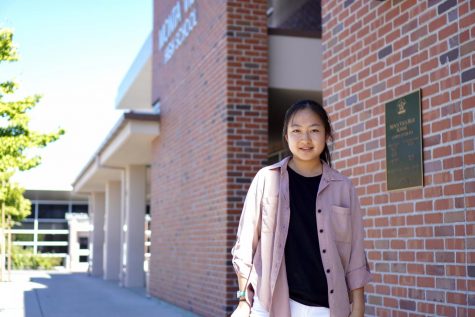Tied Down
Why we shouldn’t feel guilty for being privileged
Although we feel we’re at the top of the world, we are still tied down by guilt
November 21, 2019
Voyaging across continents, abandoning their motherland and starting afresh in an unmapped land — many of our parents braced through scarce finances and language barriers to be able to embed themselves in American society. As children, we often hear their tales of “rags to riches,” calamity and triumph — from dorming in a stifling one-bedroom apartment to making enough money to send their kids to college. Our parents left their home countries with ambitions, knowledge and hope for a better future for their kids.
As a part of Generation Z generation, we are born with convenience and privilege that we owe to the road our parents paved for us with their hard work, allowing us to relish in luxuries that were not available in previous generations. Because many of our parents left everything to come here to give us better opportunities, we tend to feel guilty when we aren’t able to live up to their standards.
The guilt that wells up inside our consciousness prompts us to repay our parents’ sacrifices with academic success at MVHS. Although we may feel that such redemption will spring forth satisfaction, we need to keep in mind that drawing happiness from our tangible academic ventures is an unhealthy practice — we shouldn’t let the guilty gravity of privilege run our lives.
We fling ourselves into an accustomed cycle of relentless studying, reviewing, test-taking and quizzing to, in one way, bring us one step closer to our dream college, but in another way, fulfill our parent’s expectations. We compensate for our guilt by undertaking hefty course loads and procuring pristine grades that show gratification to our parents — an ode to their self-sacrifices.
By subjecting ourselves to a rigid routine of self-achievement, we reiterate to ourselves that we are making our parents’ crusade to America worth the toil. We reiterate to ourselves that by enrolling in tutoring, standardized test prep classes and advanced placement courses, we bring pride to our family name through the string of A’s on our report cards. We reiterate to ourselves that we did not take our privilege for granted.
We’re still grateful for our parents, but we also feel a substantial need to live up to their legacy — to be as equally self-made and successful as they are. When we fall short of such a presumption — or a dreaded B pops up on our transcript — we feel the sting of guilt.
At times, we feel foolish for incessantly complaining about the drawbacks of our luxurious lives when our immigrant parents carried a single piece of luggage with their possessions, a wad of bills and less than half of what we have today. In comparison to the efforts and toiling that our parents underwent, our daily complaints seem trivial. From complaining about staining our favorite hoodie to protesting about sleep deprivation, our concerns appear superficial and inconsequential.
The guilt of self-redemption churns in our stomach.
There is no doubt we might feel the slightest guilt of being so privileged, not significantly contributing to society as we feel we should. However, we don’t have to put internalized pressure to rewire ourselves into valedictorian candidates. Instead, we should be grateful for the opportunities that we’ve been given by our hardworking parents and use such to bettering our well being. Guilt should not pervade our drive to succeed — happiness should.
Before we criticize ourselves for being useless people who can’t meet our parents’ expectations, we must remind ourselves that we are still young. Though our parents did grant us the luxury of privilege, we shouldn’t feel obligated to repay them through means of academic success. Privilege is a gift, and we should gratefully accept it; it is not a loan that we take and payback later. The point of our parents’ moving to Cupertino was so we don’t have to have limited options for our future; this way, we can do things we have always wanted to do, and learn things we have always wanted to learn. Our parents didn’t come all the way here just for us to feel guilt; they came so we could achieve our goals and live our dreams.
In addition to the guilt we feel for not meeting our parents’ standards, we also believe that society places an expectation onto us where our privilege means that we must make significant contributions to our communities at a very young age. Though this may seem like the case for many of us, society actually doesn’t expect us to meet these demands, rather, it’s our own guilt that creates this false image of the expectations they place on us.
Although some parents do want their kids to work as hard as they did in order to gain discipline and experience in the real world, this isn’t a justification for these kids to set aside their passions and personal goals in order to fulfill parental wishes.
Instead of feeling that we may not live up to or deserve privilege, we should focus on finding our passions. When the time comes for us to be the adept beings we are expected to be, we would be prepared for it. By having passion, we would always wind up doing something that contributes to society, and gives us enjoyment. Our parents will nonetheless be proud. After all, if we were parents, wouldn’t we do the same things they did for us?





























